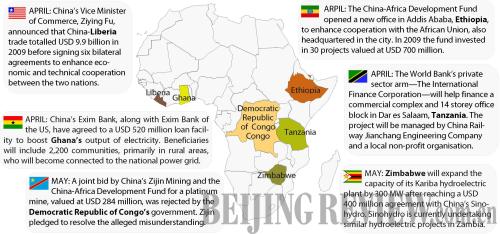|

Development of African Manufacturing
Africa is set to potentially follow in the footsteps of China's economic development, with a focus on manufactured exports. The key stepping stones toward this advancement - infrastructure development, an availability of export markets and manufacturing know-how - are largely being provided by China.
More ports, more exports
Economic development tends to follow a pattern: the predominance of agricultural and resource-based industries becomes gradually supplanted by labor-intensive manufacturing, which then gives way to capital-intensive production and innovation. China, too, is advancing along these lines. Its rapid growth is raising incomes, in turn putting upward pressure on wage rates, incrementally shifting its economy toward later stages of development. Africa may yet pick up in manufacturing in the areas where China recedes, advancing along the path of economic development - a path being increasingly laid by China itself.
To improve its ability to manufacture, Africa must first overcome its inadequate supply of energy, roads, rail and ports - its infrastructure.
To this end, China is Africa's number one contributor: 42 percent of all African construction revenue is generated by the services of Chinese contractors. The $21.6 billion in projects awarded to China in 2008 is nearly three times that of Italy, the second-largest recipient of African contracts, and seven times that of the United States. As these works come online, so too will African manufacturers.
Besides the infrastructure to produce and distribute, African manufacturers need a market in which to sell. Once again, there is China. In 2009, China became Africa's largest trade partner at $91.07 billion, surpassing trade between Africa and the United States. What's more is that China has agreed to increase the number of goods receiving zero-tariffs from 440 to nearly 5,000, for the 30 African nations deemed "least developed." With world trade accelerating after the global economic slowdown, more China-Africa trade can be expected in the future.
Then, there is what can be learned directly from Chinese manufacturers who are establishing production facilities in greater numbers within Africa. Already in 2010, a major Chinese auto manufacturer, FAW Group, invested $100 million for a project in South Africa. Through a $500 million investment from China National Chemical Engineering, Sudan will have a new chemical fertilizer plant - Sudan's largest. Manufacturing facilities will continue to sprout up as the World Bank, in joint effort with China, has called for the establishment of industrial zones in Sub-Saharan Africa.
The ChinAfrica Econometer is produced by THE BEIJING AXIS, a cross-border business bridge to/from China in three principal areas: Strategy, Sourcing & Investment.
For more information, please contact: Barry van Wyk
barryvanwyk@thebeijingaxis.com
www.thebeijingaxis.com |